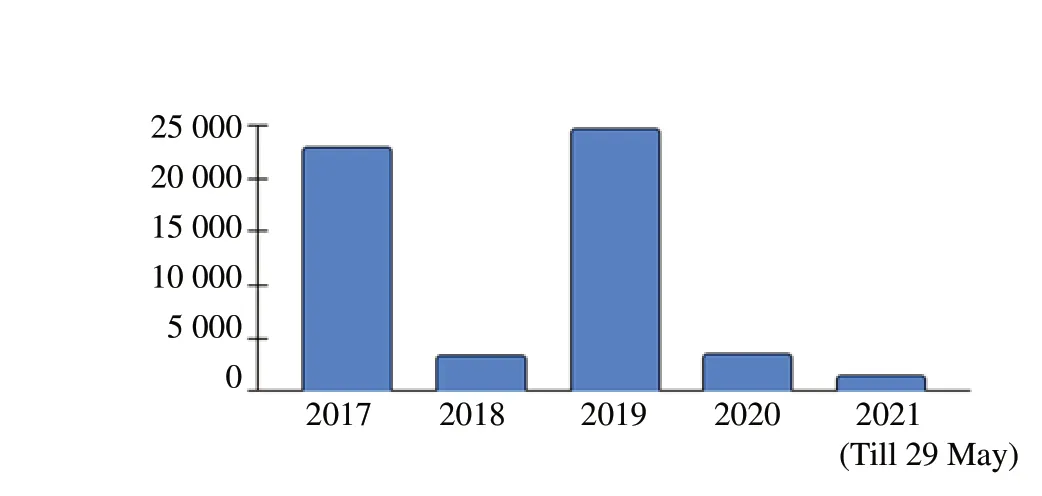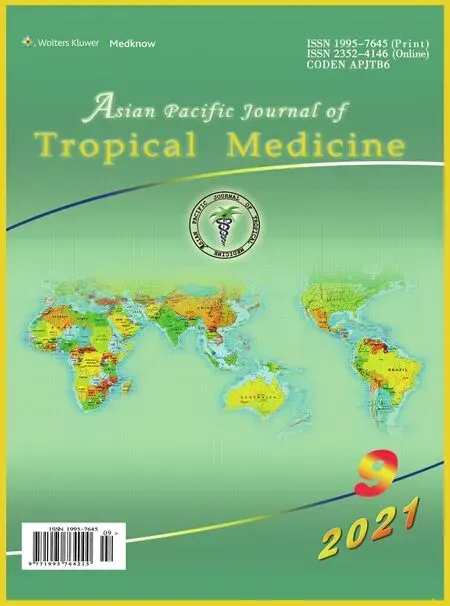Wolbachia-infected mosquitoes:The answer to the dengue endemic in Pakistan?
2021-10-23 02:53:40QaziSyedMuhammadAliMustafaAshiqHusain
Qazi Syed Muhammad Ali ,Mustafa Ashiq Husain
1Department of Internal Medicine,Dow University of Health Sciences,Karachi,Pakistan
2Department of Internal Medicine,Ziauddin University,Karachi,Pakistan
Dengue is an infectious disease of viral etiology characterized by acute flu-like symptoms with potentially lethal complications.The virus is transmitted by the mosquitoes of theAedes
genus[1].These mosquitoes dwell around small bodies of stagnant water,road puddles and open sewers.Pakistan has been dengue endemic for the last 30 years with 28 571 cases reported between 2019-2020(Figure 1).Similarly,in 2021,1 449 confirmed dengue cases[2] have already appeared,much more than expected ahead of the upcoming peak season,set to occur during the post-monsoon months.This shows us that eradication of dengue from the region is extremely important.Methods currently employed to control dengue outbreaks in Pakistan are usually limited to those at a community level and include improving sanitation,spraying insecticides,using mosquito nets and repellants[3].Vaccines against dengue virus have been developed in some parts of the world,but are not yet available for people living in Pakistan and therefore,new and innovative control strategies to overcome this disease and its spread are direly needed.
Figure 1.Reported dengue cases in Pakistan between 2017 and 2021 (till 29 May).
Deployment of virus-blockingWolbachia
-infected mosquitoes is a promising dengue control strategy.The applyingWolbachia
to Eliminate Dengue (AWED) trial conducted in Yogyakarta,Indonesia[4] is a recent study done to measure the efficacy of this method.This cluster randomized clinical trial involved the division of the study area into 24 clusters.Wolbachia
-carryingAedes aegypti
mosquitoes were deployed in 12 randomly selected intervention clusters alongside regular routine dengue control measures,while the remaining 12 control clusters only received routine dengue control measures.The results of this trial showed a 77% decrease in the incidence of symptomatic virologically confirmed dengue(VCD) in the treated areas of the city while the protective efficacy in preventing hospitalization with VCD,an indicator of clinical severity,was 86%.Along with the high protective efficacy,there are many other prospects to the vector control strategy of thisWolbachia
method that make it very lucrative to implement in Pakistan.First and foremost is its affordability,since unlike all other proposed methods,theWolbachia
method is self-sustaining and Bradyet al.
predicted this method to be cost-saving over a period of ten years with favorable benefit-cost ratios of 1.35-3.40[5].Given that the unsatisfactory performance of the economy has always been the biggest hurdle in the fight against dengue,this helps place theWolbachia
method above other more costly similar-scale alternatives such as genetically modified organism (GMO),insecticide spraying,sterile insect technique,etc.
Moreover,unlike other alternatives,theWolbachia
method does not have any harmful effects on human health,nor does it affect the vector population numbers,and hence,should not affect the food chain in the long-term.Currently,10 countries around the globe have employed theWolbachia
method to combat mosquito-borne diseases in association with the World Mosquito Program and all show promising results[6].We believe that health authorities in Pakistan should change their focus from community-driven interventions and instead prioritize nationwide vector control measures to control the dengue endemic in the country and reduce the burden on our already weak healthcare system.Conflict of interest statement
The authors have no conflicts of interest to declare.
Authors' contributions
Q.S.M.A.developed the concept and designed the manuscript;M.A.H provided key information and helped revise the manuscript.
 Asian Pacific Journal of Tropical Medicine2021年9期
Asian Pacific Journal of Tropical Medicine2021年9期
- Asian Pacific Journal of Tropical Medicine的其它文章
- COVID-19-associated mucormycosis and treatments
- Predictive modeling of 30-day readmission risk of diabetes patients by logistic regression,artificial neural network,and EasyEnsemble
- Seroprevalence of anti-HBs antibodies and the need for booster vaccination in children under 5 years of age born to HBsAg-negative mothers
- Foodborne parasitic diseases in China:A scoping review on current situation,epidemiological trends,prevention and control
- Healthy tourism initiative in the age of COVID-19 in Indonesia
